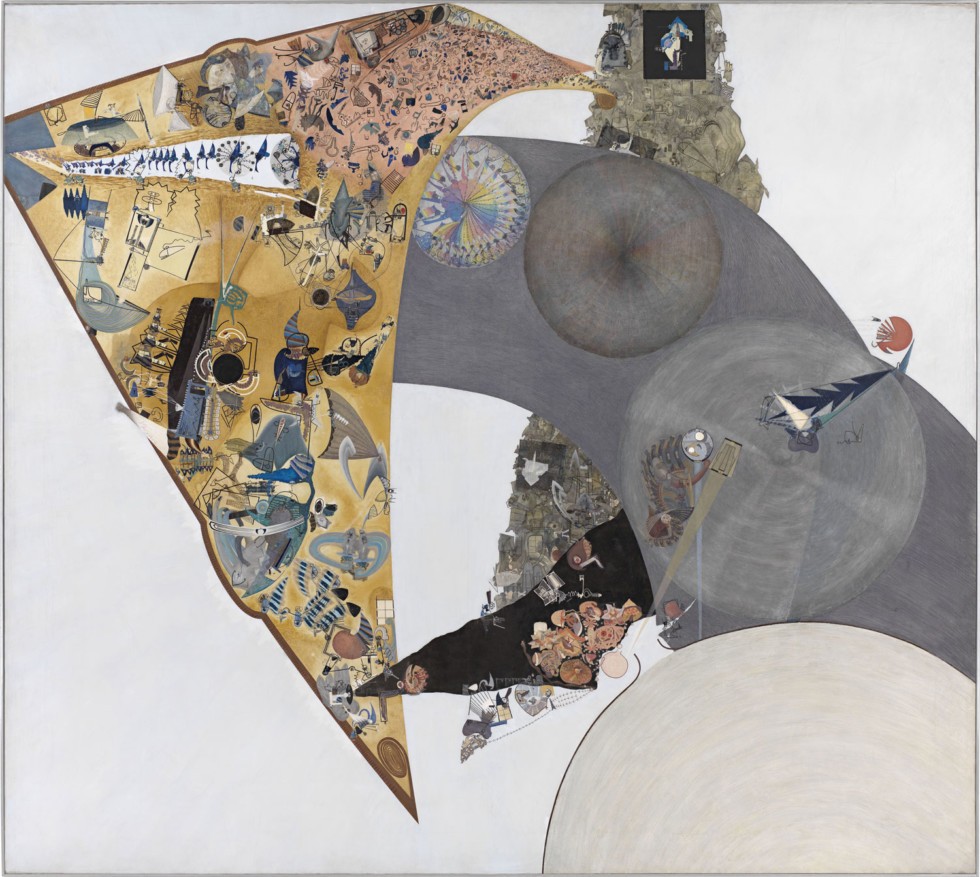Focus On Öyvind Fahlström
27 Feb 2015 - 02 Apr 2017

Öyvind Fahlström
Ade-Ledic-Nander II, 1955-57
Foto: Prallan Allsten / Moderna Museet
© Sharon Avery-Fahlström / Bildupphovsrätt 2016
Ade-Ledic-Nander II, 1955-57
Foto: Prallan Allsten / Moderna Museet
© Sharon Avery-Fahlström / Bildupphovsrätt 2016
FOCUS ON ÖYVIND FAHLSTRÖM
Part 3: Ade-Ledic-Nander
27 February 2015 – 2 April 2017
Curator: Fredrik Liew
Öyvind Fahlström worked on the Ade-Ledic-Nander suite for several years in the mid-1950s. His intention was to create some twenty paintings, but due to the time-consuming process he only completed two: Ade-Ledic-Nander 1 and Ade-Ledic-Nander 2, in 1955–1957. The suite can be seen to bridge Fahlström’s concrete use of language and signs and his veritably manic preoccupation with games and constructing worlds.
Every Friday evening, Fahlström invited people to his studio to show them how the latter painting was developing. To prevent his audience from being seduced or distracted by the totality of the composition, he had cut a hole in a sheet that hung over the painting, and spoke exclusively about the section that was visible through the hole. He also wrote a 27-page text on the two works.
In the exhibition, the paintings are presented together with the manuscript, sketches and related works that aid our understanding of their swarming contents.
How can this material be interpreted? In the introduction to his essay on Ade-Ledic-Nander, Jesper Olsson stresses that we must not forget the materialism and concrete art to which Fahlström devoted himself in the 1950s, and that the artist creates new reality and does not want to indicate or symbolise anything that is not there. And yet, he admits, it is impossible to stop our imagination when we study the paintings: “Could this be an allegory? Could it be about foreign civilisations, about the unbroken and violent search for new horizons, about knowledge or imperialism and their expansive processes? Could it be an imaginary compilation of conflicts and movements in a world of globalisation, migration and information flows?”
There are no correct answers to Fahlström’s work. We cannot claim that it is about this or that. Characteristically, it challenges the viewer and demands the capacity to hold more than one thought in our head at a time. Fahlström refuses to simplify or summarise, his practice is expressed in compositions made up of a complex weave of fragments. As in real life. His Friday evening presentations of Ade-Ledic-Nander 2 also emphasise the fact that the work consists not merely of the painted canvas, but of the very act of seeing.
Part 3: Ade-Ledic-Nander
27 February 2015 – 2 April 2017
Curator: Fredrik Liew
Öyvind Fahlström worked on the Ade-Ledic-Nander suite for several years in the mid-1950s. His intention was to create some twenty paintings, but due to the time-consuming process he only completed two: Ade-Ledic-Nander 1 and Ade-Ledic-Nander 2, in 1955–1957. The suite can be seen to bridge Fahlström’s concrete use of language and signs and his veritably manic preoccupation with games and constructing worlds.
Every Friday evening, Fahlström invited people to his studio to show them how the latter painting was developing. To prevent his audience from being seduced or distracted by the totality of the composition, he had cut a hole in a sheet that hung over the painting, and spoke exclusively about the section that was visible through the hole. He also wrote a 27-page text on the two works.
In the exhibition, the paintings are presented together with the manuscript, sketches and related works that aid our understanding of their swarming contents.
How can this material be interpreted? In the introduction to his essay on Ade-Ledic-Nander, Jesper Olsson stresses that we must not forget the materialism and concrete art to which Fahlström devoted himself in the 1950s, and that the artist creates new reality and does not want to indicate or symbolise anything that is not there. And yet, he admits, it is impossible to stop our imagination when we study the paintings: “Could this be an allegory? Could it be about foreign civilisations, about the unbroken and violent search for new horizons, about knowledge or imperialism and their expansive processes? Could it be an imaginary compilation of conflicts and movements in a world of globalisation, migration and information flows?”
There are no correct answers to Fahlström’s work. We cannot claim that it is about this or that. Characteristically, it challenges the viewer and demands the capacity to hold more than one thought in our head at a time. Fahlström refuses to simplify or summarise, his practice is expressed in compositions made up of a complex weave of fragments. As in real life. His Friday evening presentations of Ade-Ledic-Nander 2 also emphasise the fact that the work consists not merely of the painted canvas, but of the very act of seeing.
